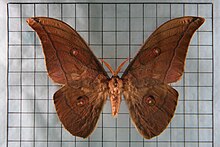Antheraea yamamai, the Japanese silk moth or Japanese oak silkmoth (Japanese: yamamayu(ga) (山繭(蛾)・ヤママユ(ガ)) or tensan (天蚕)) is a moth of the family Saturniidae. It is endemic to east Asia, but has been imported to Europe for tussar silk production and is now found in southeastern Europe, mainly in Austria, northeastern Italy, and the Balkans. It seems to be spreading north and a population has been reported near Deggendorf and Passau in Germany.[2] The species was first described by Félix Édouard Guérin-Méneville in 1861. It has been hybridized artificially with Antheraea polyphemus of North America.[3]
| Antheraea yamamai | |
|---|---|

| |
| Living adult | |

| |
| Antheraea yamamai superba | |
| Scientific classification | |
| Domain: | Eukaryota |
| Kingdom: | Animalia |
| Phylum: | Arthropoda |
| Class: | Insecta |
| Order: | Lepidoptera |
| Family: | Saturniidae |
| Genus: | Antheraea |
| Species: | A. yamamai
|
| Binomial name | |
| Antheraea yamamai Guérin-Méneville, 1861[1]
| |
| Synonyms | |
| |




This moth has been cultivated in Japan for more than 1000 years. It produces a naturally white silk that is very strong and elastic, but does not dye well. It is now very rare and expensive.[4]
The wingspan is 110–150 millimetres (4.3–5.9 in). Adults are on wing from August to September in one generation depending on the location.
The larva mainly feed on Quercus species, but have also been reported on Fagus sylvatica, Castanea sativa, Carpinus, Rosa, and Crataegus.
In order to look at the tensan silk genes in more detail a de novo genome and set of transcriptomes have been sequenced, producing a 700Mb reference with 15,481 genes.[5]
Subspecies
edit- Antheraea yamamai yamamai
- Antheraea yamamai bergmani Bryk, 1949
- Antheraea yamamai titan Mell, 1958
- Antheraea yamamai ussuriensis Schachbazov, 1953
- Antheraea yamamai superba Inoue, 1964 (Taiwan)
References
edit- ^ Nahirnić, Ana; Beshkov, Stoyan (21 October 2015). "The first report of Japanese oak silkmoth Antheraea yamamai (Guérin-Méneville, 1861) (Lepidoptera: Saturniidae) in Montenegro" (PDF). ZooNotes (82): 1–4. Retrieved 8 March 2021.
- ^ "Deggendorf and Passau report" (PDF). Archived from the original (PDF) on October 7, 2011. Retrieved October 18, 2011.
- ^ See Antheraea polyphemus, Gary Botting
- ^ "Information sheet". United Nations FAO. Archived from the original on 2012-10-21.
- ^ Park, Seung-Won; Goo, Tae-Won; Kim, Iksoo; Kim, Minjee; Hwang, Jae-Sam; Kim, Seong-Wan; Choi, Kwang-Ho; Kim, Su-Bae; Kim, Kee-Young (2018-01-01). "Genome sequence of the Japanese oak silk moth, Antheraea yamamai: the first draft genome in the family Saturniidae". GigaScience. 7 (1): 1–11. doi:10.1093/gigascience/gix113. PMC 5774507. PMID 29186418.
External links
edit- Taxonomy Fauna Europaea
- Lepiforum e.V.
- Saturniidae of the Western Palaearctic